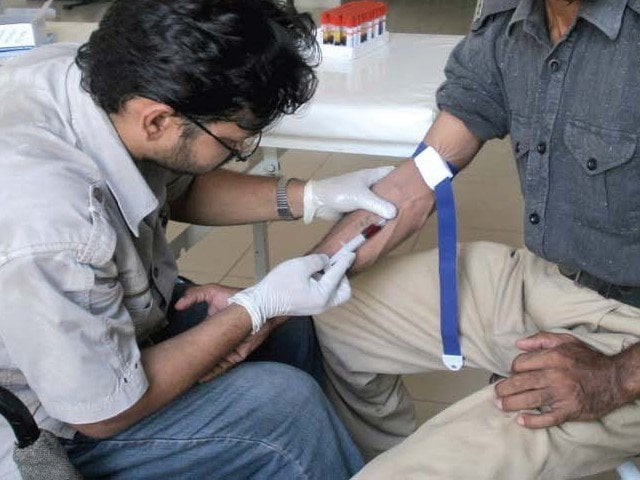Around 35% people in Sindh infected with hepatitis virus, say experts
Speakers discuss prevalence of hepatitis B and C in Pakistan at consultative meeting

If screened and diagnosed earlier, hepatitis patients can be properly treated, said an expert. PHOTO: EXPRESS/FILE
Hepatologists and gastroenterologists shared on Tuesday these figures during a consultative meeting that was organised by the Pakistan GI and Liver Diseases Society (PGLDS) to observe the World Digestive Health Day 2018.
According to the experts, at least 20 million people in Pakistan are infected with hepatitis B and C, which amounts to 10% of the total population of the country. However, the ratio of hepatitis-infected persons is much higher in Sindh.
Punjab witnesses alarming surge in hepatitis patients
PGLDS patron and gastroenterologist Dr Shahid Ahmed said the World Health Organisation (WHO) had set the target of the elimination of hepatitis B and C from the world by 2030, however, keeping in view the state of affairs in Pakistan, especially Sindh, it seemed to be a far cry. "Government and private sector will have to make collaborative efforts on a war-footing to contain and eradicate this menace as it is easy to screen, diagnose and treat viral hepatitis these days," he added.
According to Dr Ahmed, thousands of people were annually dying young in Sindh due to hepatitis, whose lives could be saved by proper screening and treatment, which was now cost-effective and in the financial range of most of the people in Pakistan.
"Most of the patients of viral hepatitis do not know about their disease until its gets into chronic stage and badly damages their livers. If screened and diagnosed earlier, these patients can be properly treated and viruses can be eliminated from their bodies", the PGLDS patron maintained.
Dr Ahmed also offered the services of PGLDS experts to the Sindh health department for the eradication of hepatitis in the province. "We have hundreds of consultants and postgraduates as our members who are working [across] Sindh. They can play an active role in containing this", he said.
AKUH, health dept partner up to eliminate hepatitis C
PGLDS President Dr Sajjad Jamil from Liaquat National Hospital (LNH), Karachi said Pakistan had the second highest number of viral hepatitis patients after China. He added that China reduced the number of hepatitis B patients to only 1% through effective vaccination.
"Screening, diagnosis and treatment of hepatitis B and C is now very easy and cost-effective. Tablets are available which can cure this disease up to 99% which also have very little side effects", Dr Jamil said. He added that the real challenge was to know the actual number of infected people and convince them to start their treatment.
PGLDS Vice-President Dr Lubna Kamanai, gastroenterologist at LNH, demanded that the government make the hepatitis screening certificate mandatory at the time of the issuance of computerised national identity cards to citizens so that the government could know the actual number of patients infected with viral hepatitis in the country.
She also asked the government to arrange free-of-charge screening of hepatitis B and C in Pakistan so that people could know whether they were infected with hepatitis virus as in most of the cases, people become aware of the disease when they had become chronic patients.
Health dept to screen differently-abled children
Dow University of Health Sciences Registrar Dr Amanullah Abbassi claimed that the Sindh government had not winded up its Hepatitis Control Programme. He informed the meeting that the health department had been collaborating with the Aga Khan Hospital and non-governmental organisations for the elimination of viral hepatitis in the province.


















COMMENTS
Comments are moderated and generally will be posted if they are on-topic and not abusive.
For more information, please see our Comments FAQ